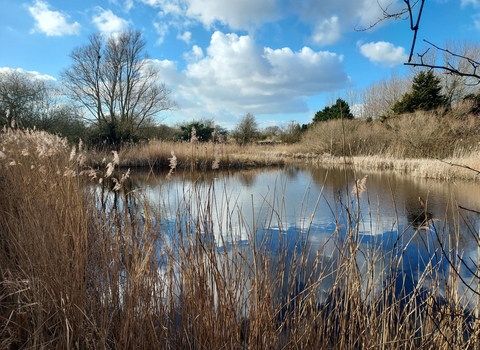Excitement is high at the Great Fen in Cambridgeshire as work starts on Peatland Progress: A New Vision for the Fens. This visionary partnership project led by the Wildlife Trust for Beds, Cambs and Northants (WTBCN) was awarded more than £8m earlier this year by The National Lottery Heritage Fund Heritage Horizon programme.
The project is officially launched today, Friday 23 June, by The National Lottery Heritage Fund area chair Julian Glover OBE and WTBCN CEO Brian Eversham. Peatland Progress is tackling really big issues: climate change; loss of biodiversity; getting people closer to nature; health and wellbeing, especially mental health.
A new land purchase, Speechly’s Farm, is enabling the next big step, uniting the Great Fen's northern and southern halves, creating a sustainable, wildlife-filled, working wet landscape. In this 120 hectare area Peatland Progress will expand a new model of agricultural production, wet farming - or paludiculture - with crops such as typha bulrush and sphagnum moss, building on successful three year trials. Typha has many applications including lightweight insulation and filling for clothing; sphagnum is a growing medium capable of retaining 20 times its dry weight in water. This work will inform and inspire both conservation and farming practice on peat soils across the UK and further afield, with the new wet landscape preventing the loss of peat soils and locking in carbon dioxide.
Work has started to bring together scientists, academics, business people and land managers to explore the possibilities of this new farming system and its new crops. Partnerships include experts in wet farming at the University of East London, and the UK Centre for Ecology & Hydrology, world leaders in climate change science, measuring greenhouse gases and gathering data to explore and demonstrate how wet farming locks in carbon dioxide.
Peatland Progress is also bringing people closer to nature to reap its benefits for health and wellbeing. A new people friendly landscape will be created in the centre of the Great Fen enabling people to experience nature in close-up. Links are also being made with local community-based groups such as the Young People’s Counselling Service (YPCS) in Yaxley, to create nature-based interventions and programmes supporting young people experiencing mental health issues and their families, giving them the confidence to know that small changes can make a big difference, bringing hope for the future.
Kate Carver, Great Fen Project Manager, says: “Peatland Progress will enable us to build on our successes, to grasp a unique opportunity to connect two iconic wetland reserves, and to elevate our activity to new levels - through farming innovations, research, and through a deeper connection with established and new audiences. This will raise the Great Fen from being a landscape transforming access to wildlife in the local area, to a forward-looking place which impacts on, inspires and brings genuine improvement to the lives of people and protects the very character and local heritage of a region. Many thanks to players of the National Lottery.”
Eilish McGuinness, Chief Executive, The National Lottery Heritage Fund, says: “Peatland Progress is a truly ambitious and visionary project; the scheme, part of our Heritage Horizons programme focussed on innovation in heritage, is pioneering, leading the way to champion large-scale, long-term and innovative solutions to climate change and nature’s crises, with people at the core.”
Craig Bennett, Chief Executive of The Wildlife Trusts, says: “The acquisition of Speechly’s Farm marks a historic moment in the history of The Wildlife Trusts and the Great Fen. Woodwalton Fen, our very first reserve acquired in 1919, can now be reunited with Holme Fen via a continuous swathe of natural re-wetted fenland. Home to rare species such as marsh dock, marsh harriers and scarce chaser dragonfly, the potential to restore even more nature to this special place is immense. By reconnecting these vital wetland habitats for wildlife, we hope many more people will be able to experience and enjoy this precious landscape.”
Jack Clough, University of East London, says: “Peatland Progress provides a rare opportunity to increase the connectivity between two separate peatland nature reserves. This will most importantly lead to enhanced long-term sustainability for both areas, but also provides the space and funding to expand research into wetland friendly farming beyond the initial trial plots taking place at the Great Fen.
“This is hugely exciting as wet farming, as a nature-based solution, offers real ecosystem benefits through carbon emission reductions, biodiversity gain and water chemistry improvements. Wet farming also opens opportunities to develop new products and markets in areas such as bio-based building materials, peat replacement and much more. Peatland Progress comes at the perfect time, as wet farming is in its infancy here in the UK, so will have a huge positive impact as a demonstration project.”
Dr Ross Morrison, biometeorologist at the UK Centre for Ecology & Hydrology says: “Peatlands capture and store large amounts of atmospheric carbon, playing an important role in regulating the carbon and water cycles and global climate. Despite this, large areas of peatland have been degraded by economic activity, especially drainage for agriculture and forestry. Drainage causes these carbon dense ecosystems to release large quantities of greenhouse gases to the atmosphere, contributing to climate warming.
“Wet farming has the potential to deliver multiple benefits and ecosystem services. However, the scientific evidence base for paludiculture in the UK is currently limited, so we look forward to generating new data on how this emerging land use will impact greenhouse gas emissions, regional hydrology and biodiversity in lowland peatland environments.”
Alison Graham, chair YPCS, says: “YPCS are first and foremost a charity that provides counselling but if we can achieve other gains in this exciting partnership with the Wildlife Trust, and engage young people in the natural world by igniting a passion for conservation and open horizons to hope and the future, then we are part of a very rich intervention indeed.’’
A celebratory launch for the Peatland Progress: A New Vision for the Fens is taking place on Friday 23 June at the Great Fen.


